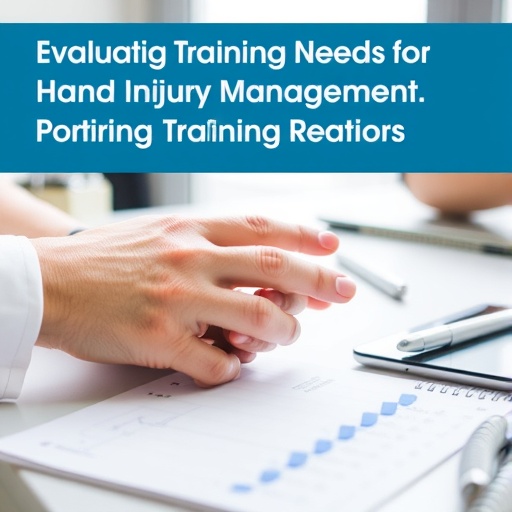In the dynamic realm of medical education, assessing the training needs of healthcare professionals is paramount, particularly in specialized fields such as the management of hand tendon injuries. A ground-breaking study conducted by acclaimed researchers A.M. Sonbol, A. Abulnaja, and A.A. Alammar addresses this significant gap within the training of Saudi residents. Published in the prestigious BMC Medical Education, this research offers a novel approach to identifying the training requisites necessary for optimal patient care, anchoring its findings on empirical data to establish a valid tool for training assessment.
The impetus behind this study stems from the increasing incidence of hand tendon injuries within the population, coupled with the critical need for healthcare providers to possess optimized skills and knowledge to manage these injuries effectively. Hand tendon injuries can lead to profound functional deficits, impacting not just the livelihood of patients but also their quality of life. The necessity for a robust training framework in this area is thus underscored by both clinical necessity and the evolving landscape of medical practice in Saudi Arabia.
Utilizing a comprehensive survey design, the researchers meticulously gathered data from residents across various medical institutions in Saudi Arabia. This methodological approach allowed for a broad assessment of existing knowledge, perceived training deficits, and the overall confidence of residents in handling hand tendon injuries. By leveraging quantitative data, the study highlights specific areas where training is lacking, providing a clear roadmap for future educational endeavors.
The research team employed a multistage sampling strategy to ensure a representative sample of residents from diverse medical backgrounds and specialties. This strategy not only reinforces the validity of the study but also enriches the findings, as it includes the perspectives of practitioners who may encounter hand tendon injuries in varied clinical settings. The results underscore the importance of inclusivity in medical training programs, as they cater to residents’ different levels of experience and expertise.
A pivotal aspect of this study is the development and validation of an assessment tool specifically designed to gauge training needs in the management of tendon injuries. This tool not only promises to streamline the identification of knowledge gaps but also serves as a foundation for future curricular improvements. By employing psychometric evaluation methods, the researchers ensured that the tool is both reliable and valid, making it a significant addition to the educational resources available to residency programs.
Moreover, the findings reveal that residents often feel underprepared to manage complex hand tendon injuries. This sentiment highlights an urgent call to action for medical educators and institutional leaders to bridge this educational gap. By integrating targeted training modules based on the identified needs, residency programs can enhance the competency of their trainees and ultimately lead to improved patient outcomes.
One of the remarkable features of this research is its potential applicability beyond the borders of Saudi Arabia. While tailored to the local context, the framework established by the authors can serve as a template for other countries grappling with similar challenges in training healthcare professionals. The universality of the issue of hand injuries in healthcare settings signifies that the outcomes of this study could resonate on a global scale, fostering an international dialogue on best practices in medical education.
Additionally, the study’s insights into the psychosocial aspects of training are invaluable. It elucidates how confidence in handling surgical procedures is crucial for the performance of residents. The interplay between theoretical knowledge and practical skills emphasizes the need for simulation-based training and hands-on practice within residency curricula. By fostering an environment in which residents can practice in a controlled setting, medical institutions can significantly enhance the preparedness of their trainees.
Furthermore, the implications of this research extend to continuous professional development for practicing physicians. As medical knowledge progresses, it is vital for healthcare professionals to engage in lifelong learning, particularly in a field as intricate as hand surgery. The training tool developed through this study could be adapted for use in continuing medical education (CME) settings, thus ensuring that even seasoned professionals remain adept in their skills and knowledge.
The authors aptly call for collaboration among various stakeholders in the healthcare education ecosystem—medical schools, hospitals, and professional bodies—to implement their findings. Such collaborative efforts could lead to the establishment of standardized training protocols for the management of hand tendon injuries, fostering a culture of excellence that prioritizes patient safety and effective care.
In conclusion, the study conducted by Sonbol et al. marks a significant advance in the field of medical education, particularly concerning the management of hand tendon injuries among Saudi residents. By expertly identifying training needs and developing a reliable assessment tool, this research not only enhances the educational framework for future physicians but also ultimately contributes to better patient care. The call for immediate actions based on these findings is not merely an academic exercise; it is a vital component in the quest for improved health outcomes in a constantly evolving medical landscape.
The importance of this research cannot be overstated, as it provides crucial insights into training methodologies required for the management of hand tendon injuries while addressing gaps in current medical education best practices. As healthcare systems worldwide strive to enhance the quality of care, studies like this highlight the vital interplay between education, training, and health outcomes.
Subject of Research: Training needs assessment for the management of hand tendon injuries among Saudi residents.
Article Title: Assessing training needs of hand tendon injuries management in Saudi residents: valid and reliable tool.
Article References: Sonbol, A.M., Abulnaja, A., Alammar, A.A. et al. Assessing training needs of hand tendon injuries management in Saudi residents: valid and reliable tool. BMC Med Educ 25, 1211 (2025). https://doi.org/10.1186/s12909-025-07796-2
Image Credits: AI Generated
DOI:
Keywords: Medical education, hand tendon injuries, training assessment, residency programs, healthcare outcomes.




